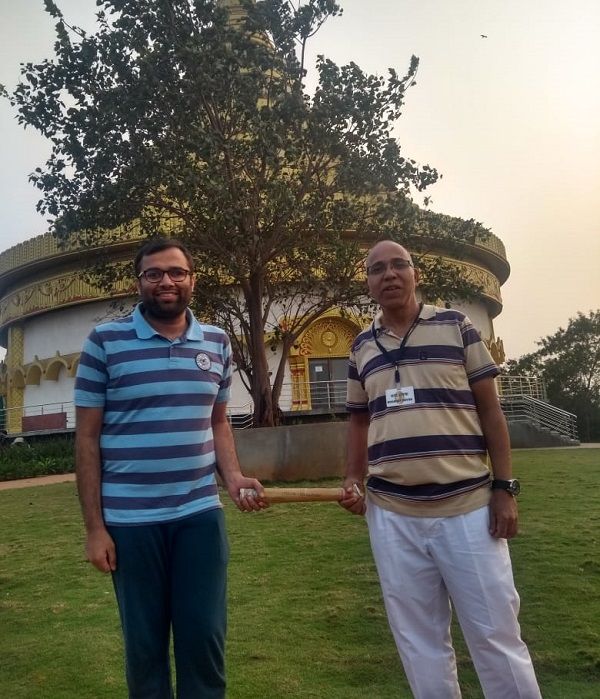
People are increasingly exploring meditation as a way to mental wellbeing. Vineet Saraiwala, who has retinitis pigmentosa and is an avid trekker, marathoner and an endurance cyclist, rang in 2020 at a meditation centre. Here, he writes about his experiences and the questions people harbour about meditation.
Meditation can produce a deep state of relaxation and a tranquil mind. It keeps the mind focussed and body relaxed and provides inner calm.
Recently, I went to for 10-day introductory meditation course to Dhamma Vipula Vipassana Meditation Center in New Mumbai. Meditation has been around for thousands of years. It is a powerful tool for achieving equanimity and understanding the philosophy of impermanence.
Although, it was a gruelling 10-day experience of consciousness with no access to the outer world and maintaining complete silence. We used to wake up at 4am with the sound of the bells and go to bed at 9.30pm with over 10 hours of meditation. Sitting in the upright posture, disconnecting with loved ones and focussing your wandering mind were tough for an amateur like me.
While meditation cannot cure diseases, it can help keep the mind and body relaxed, reduce anxiety, and ease distress - all of which have a positive effect mentally and physically.
To help me navigate my way around the campus and follow schedules, I was helped by a sighted Dhamma server. Since no human contact is allowed, we used to be connected with a paper rolled like a long baton. I used to hold one end and he would be at the other end.

I realised, there are several misconceptions surrounding meditation. I had to fend off many questions when I enrolled for the course. Most of them had negative implications. I am enumerating some of them below.
1. Are you too young to go for vipasana?
“You are too young to go for vipasana”, remarked an office colleague when she heard I had gone for meditation. It’s not true that younger people cannot go for meditation or there is a defined age for learning meditation. Many people feel that a meditation is learnt during a crisis which is completely baseless. Meditation is a good thing and a way of life. I would strongly recommend young people to start learning meditation without any pre-existing notions for the right age to arrive.
2. Are you leaving your job?
One of my friends told me that he does not go to meditation retreats for the fear of changing his life’s trajectory. Two of his friends went to a meditation retreat and settled for the social sector from a high paying corporate career. He too fears such a transformation. It completely depends on the individual experiences but a pre-existing notion of switching career paths because of meditation is not true at all. We don’t become sanyasis after a meditation retreat.
3. Are you brainwashed into a cult?
Meditation is a universal practise of self-awareness and has no linkages with any cult or religion. People often think that retreats systematically brainwash them into joining a cult or a religion. I loved the discourses but in these 10 days, I never felt that I was forced into any commune.
4. Are you depressed?
It is the most commonly asked question when you are planning to go for a meditation retreat. Friends and family start interrogations about your life and get stunned when you decide to lock yourself away from humanity in a 10-day odyssey. When a person goes to Goa for a holiday or explores meditation retreats, chances of depression might apply to both scenarios equally. And, so what if I am depressed and seeking help - What’s wrong? There is some evidence that regular practice of meditation can help better manage stress and anxiety which can trigger depression. In fact, it is completely wrong to infer one’s mental condition just because he is going to a meditation retreat. People also meditate to forge a deeper connect with themselves.
5. Are you stressed?
This was another question I was asked frequently, both before and after my meditation. I had to keep telling people that “No, I am not stressed. I had gone just for the experience.” But yes I was sleeping better, more soundly, with no thoughts crisscrossing my mind and keeping me awake.
6. Are you seeking the meaning of life?
I was often asked this question after my retreat. They want to listen to stories of inner transformation and spiritual awakening. Meditation retreats don’t make you saints or an ultimate authority on life. These retreats make you calm and aware of yourself and your actions. And, with continuous practise, it makes you stiller. I feel, I was neither enlightened nor did I suddenly discover the purpose of living.
(Vineet Saraiwala, Inclusion Lead, Future Retail Limited leads projects for a Big Bazaar and is contributing in mainstreaming inclusion across India in his own small way. He is an alumnus of the Indian Institute of Management, Bangalore (IIMB). He loves reading non-fiction books and charting unconventional paths to make the world a better place.)






